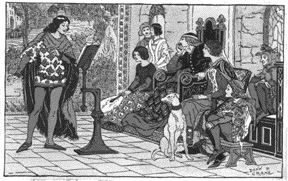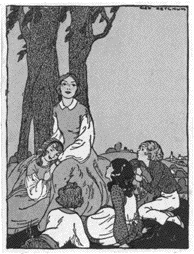
Illustration by Donn P. Crane for "My Book House"
The Untold Story
by Juan Wilson
© 1994 The Gobbler: Summer
Bounty
It is something that is slipping from us
every day. We lose it when we turn from a conversation to
watch TV or tune out dad's old story with a Walkman's headphones.
What we've lost is our ability to tell and listen to stories.
What is a story? It's something that has
a beginning ("Once upon a time....") and an end ("...and they
lived happily ever after"). In the middle something happens
to someone and someone does something about it. Stories are
a form of art that provide us a frame of reference and a point
of view. They allow us to identify with another person in
another situation. Finally, stories have a point ("...and
the moral of the story is..."). A good story entertains and
engages us and maybe even teaches us a lesson or makes things
clearer. The best stories make life more meaningful or even
change our lives.
Most of us pay for stories these days. We
go to movies, rent videos, or watch TV. But that is only a
recent phenomena. In the last few centuries, before electricity,
people got their stories from the printed page, or handwritten
letter. Most people today are too young to remember a time
before radio and television, to a time when people entertained
themselves writing correspondence to loved ones and friends.
It was considered an art form unto itself.
For millenia, before widespread literacy,
people heard stories that were told to them personally by
storytellers. Through most of human history the majority of
our knowledge came from these spoken words. Great stories
were handed down through scores of generations becoming legend,
epic or myth.
Why should we care how we get our stories
as long as they are entertaining and informative? Why should
we listen to, or tell stories today when we have cable TV?
For a couple of reasons. Our own stories told through the
spoken word or written can be about us or someone close to
us and therefore be more personally meaningful. Also, story
telling itself is as important as listening to stories. It
is a creative process requiring skill, experience and knowledge
of the audience.

Illustration by George Metchum for "My Book House"
Much of what is known about us as individuals
is what has been told in stories, whether tragic or funny,
or as gossip. Yes, even gossip is a form of storytelling.
It is one of the few kinds of stories still told today. But
even that seemingly indestructable institution is threatened
by "Hard Copy", "Day One", "First Edition" and other TV celebrity
gossip shows that thrive on the tragedy of celebrities, making
the details of their lives more important than our own.
One of the most astute observers of our time
was Marshall McLuhan. He was the Director of the Center for
Culture & Technology at the University of Toronto. Thirty
years ago he published a book titled "Understanding Media:
The Extensions of Man". The New York Herald Tribune said of
him "McLuhan is the most important thinker since Newton, Darwin,
Freud, and Einstein." McLuhan's influence on TV, advertising,
and other media related fields is incalculable.
The central thesis in "Understanding Media"
is that all forms of communication involve physical media
that in effect become extensions of our bodies. Moreover,
to properly perceive communications media like TV, photography,
or even the written word; we must physically and psychologically
change ourselves. Ultimately, the media by which we communicate
has more influence on us than the content of what is communicated.
This is precisely presented in McLuhan's followup book "The
Media is the Message."
McLuhan recognized that the behavioral effect
of TV on children had little to do with how "educational"
or uplifting the content. TV brings about a short attention
span in the viewer regardless of the show watched. He also
saw the distinct differences between oral and literate societies.
In Western society the fusion and transition
between oral to literate society was the compilation of the
Bible. The spoken word was the primary means to preserve and
pass wisdom. The compilation of the bible took the results
of thousands of years of spoken story telling and recorded
them in the Old Testament. These stories, in part, summarized
the knowedge of western man up to that time in a form that
was repeatable generation to generation.
There are ancient examples even today of
this oral tradition passing knowledge. Have you ever thought
about how you learned to play the game tag or hopscotch. They
were most likely taught to you by another child. Many of the
games we first learn have been passed from child to child,
generation to generation for hundreds of years without the
intervention of adults.
It was a shock for me to learn that a childhood
rhyme and dance I learned as a child dates back to 13th century
Europe, at the time of the Black Plague. The rhyme was "Ring
Around the Rosy". In the 1950's schoolyard of my youth we
danced in a circle singing the words. At the end we would
all fall down and laugh. The words were:
Ring around the rosy,
Pocket full of posy,
Ashes, Ashes
All fall down.
Scholars say this song refers to discoloring
around the open sores on plague victims. Posy was apparently
an herb that was carried to protect children and others from
the disease. I don't know if children still sing these words,
but if they do I doubt they know where they came from or what
they mean.
Some cultures, that have survived to the
present, rely heavily on the spoken word. Native Americans
and Hawaiians are examples.
In researching an article on local Native
American traditional ceremonies it became obvious that it
would not be easy to discover the details of these ceremonies.
Even finding the dates and times of annual events was not
to be found in the Salamanca Indian Library or other places
consisting of written records. It seems this information has
not been documented intentionally, and is only passed on through
the spoken word, face to face. In this way these ceremonies
are protected from exposure to the "wrong"people.
Stories are often told amongst those of a
kind. Within a family, social group, age group, or other kin.
They bond us together. They tribalize us. Understanding stories
lets you understand others.
In this issue of The Gobbler we have three
articles that relate to storytelling. Two are articles from
the past. One, "My Childhood on the Farm", is an eyewitness
account of life in our area around the end of World War I. This
is about as far back as eyewitness accounts can take us. The
other, "Remembering Watts Flats", is a third-party account of
the spoken word of an eyewitness. This takes us back to about
the Civil War. Our last story is a fictional account of baseball's
opening day, and, of course, fiction can take us anywhere and
anytime. Hope you enjoy them.
Story
Index |